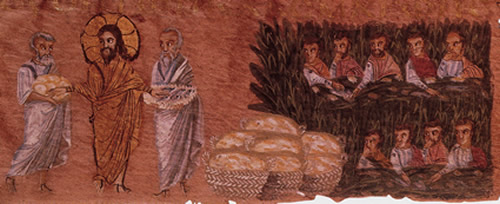
Endurance Test
The journey of discipleship is a life-long exodus from the slavery of sin and death to the holiness of truth in Mount Zion, the promised land of eternal life.
The road can get rough. And when it does, we can be tempted to complain like the Israelites in this week’s First Reading.
We have to see these times of hardship as a test of what is in our hearts, a call to trust God more and to purify the motives for our faith (Deuteronomy 8:2-3).
As Paul reminds us in this week’s Epistle, we must leave behind our old self-deceptions and desires and live according to the likeness of God in which we are made.
Jesus tells the crowd in this week’s Gospel that they are following him for the wrong reasons. They seek him because he filled their bellies. The Israelites, too, were content to follow God so long as there was plenty of food.
Food is the most obvious of signs—because it is the most basic of our human needs.
We need our daily bread to live. But we cannot live by this bread alone. We need the bread of eternal life that preserves those who believe in him (Wisdom 16:20, 26).
The manna in the wilderness, like the bread Jesus multiplied for the crowd, was a sign of God’s Providence—that we should trust that he will provide.
These signs pointed to their fulfillment in the Eucharist, the abundant bread of angels we sing about in this week’s Psalm.
This is the food that God longs to give us. This is the bread we should be seeking.
But too often we don’t ask for this bread. Instead we seek the perishable stuff of our every day wants and anxieties. In our weakness we think these things are what we really need.
We have to trust God more. If we seek first his kingdom and his righteousness, all these things will be ours as well (Matthew 6:33).
Guigo II the Carthusian
Meditation 10
The soul’s bread is Christ, “the living bread that came down from heaven” (Jn 6,51) who gives food to his own, by faith here and by vision in the world to come. For Christ dwells in you by faith and faith in Christ is Christ in your heart (Eph 3,17). The measure of your faith in Christ is the measure of your possession of him.
Truly Christ is a single loaf, for there is “one Lord, one faith” (Eph 4,5) for all believers, even though some receive more, others less of the gift of that same faith… Just as truth is one, one faith in that only truth guides and nourishes all the faithful and “one and the same Spirit distributes his gifts as he wishes” (1Cor 12,11).
And so we all live by the same bread, each of us receiving our share, and yet Christ is wholly there for all of us, except those who rend our unity… In this gift I have received I possess Christ wholly and Christ wholly possesses me just as the member belonging to the whole body likewise possesses the body in its entirety. And so this portion of faith you have received as your share is like the morsel of bread in your mouth. But unless you often devoutly meditate over what you believe, unless you chew over it, so to speak, moving it about and turning it over with your teeth, that is to say with your spiritual senses, it will never enter your throat, in other words it won’t get as far as your understanding. For indeed, how could you understand anything that you reflect over only rarely and carelessly, especially when it concerns something subtle and unseen?…
So, by means of meditation, let “the Law of the Lord be ever on your lips” (Ex 13,9) so that a sound understanding may be brought to birth within you. Through a good understanding spiritual food passes into your heart so that you will not neglect what you have understood but will lovingly reflect over it.
